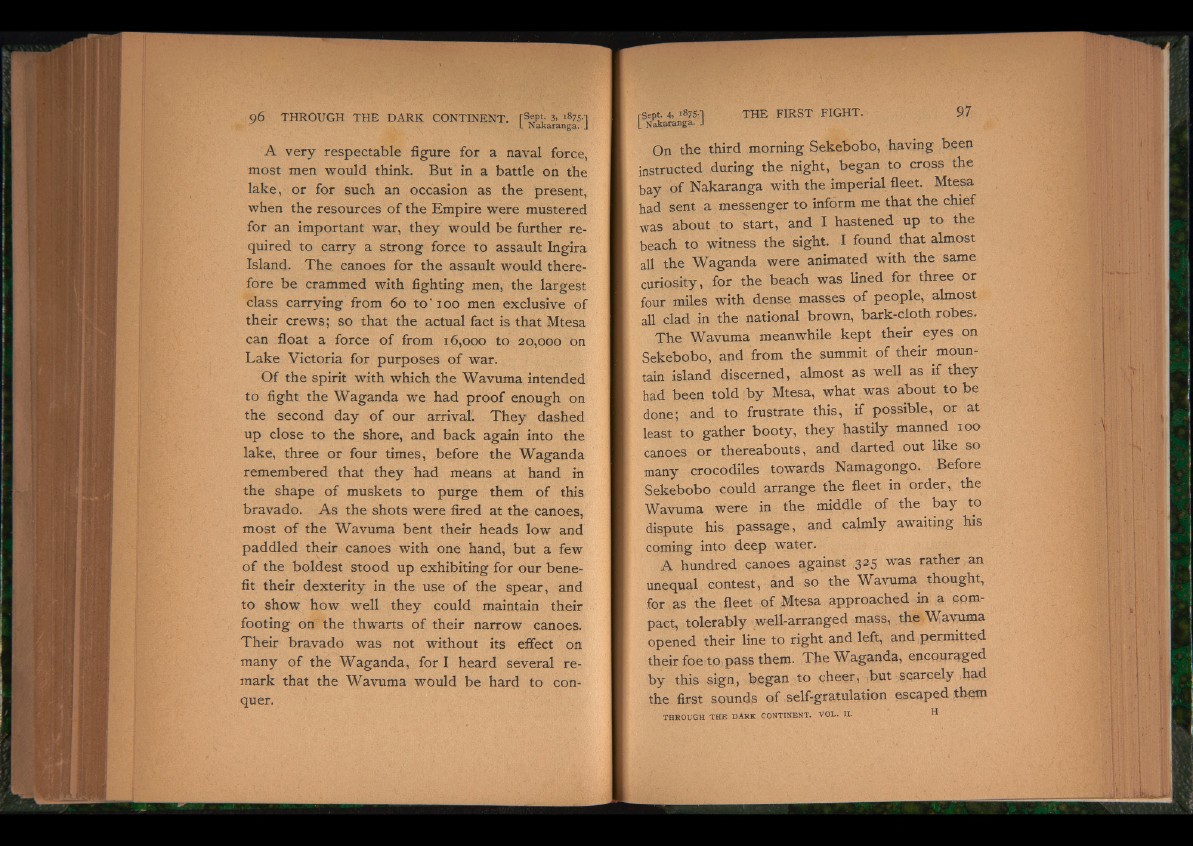
A v e ry respectable figure for a naval force,
most men would think. But in a battle on the
lake, or for such an occasion as the present,
when the resources o f the Empire were mustered
for an important war, th ey would be further required
to carry a strong force to assault Ingira
Island. The canoes for the assault would therefore
be crammed with fighting men, the largest
class carrying from 60 to * 100 men exclusive of
their crews; so that the actual fact is that Mtesa
can float a force o f from 16,000 to 20,000 on
Lake Victoria for purposes o f war.
O f the spirit with which the Wavuma intended
to fight the Waganda we had p ro o f enough on
the second day o f our arrival. T h e y dashed
up close to the shore, and back again into the
lake, three or four times, before the Waganda
remembered that they had means at hand in
the shape o f muskets to purge them o f this
bravado. A s the shots were fired at the canoes,
most o f the Wavuma bent their heads low and
paddled their canoes with one hand, but a few
o f the boldest stood up exhibiting for our benefit
their dexterity in the use o f the spear, and
to show how well they could maintain their
footing on" the thwarts o f their narrow canoes.
Their bravado was not without its effect on
many o f the Waganda, for I heard several remark
that the Wavuma would be hard to conquer.
On the third morning Sekebobo, having been
instructed during the night, began to cross the
bay o f Nakaranga with the imperial fleet. Mtesa
had sent a messenger to inform me that the chief
was about to start, and I hastened up to the
beach to witness the sight. I found that almost
all the Waganda were animated with the same
curiosity, for the beach was lined for three or
four miles with dense masses o f people, almost
all clad in the national brown, bark-cloth robes.
The Wavuma meanwhile kept their eyes on
Sekebobo, and from the summit o f their mountain
island discerned, almost as well as if th ey
had been told b y Mtesa, what was about to be
done; and to frustrate this, if possible, or at
least to gather booty, they hastily manned 100
canoes or thereabouts, and darted out like so
many crocodiles towards Namagongo. Before
Sekebobo could arrange the fleet in order, the
Wavuma were in the middle o f the b a y to
dispute his passage, and calmly awaiting his
coming into deep water.
A hundred canoes against 325 was rather an
unequal contest, and so the Wavuma thought,
for as the fleet o f Mtesa approached in a compact,
tolerably well-arranged mass, the Wavuma
opened their line to right and left, and permitted
their foe to pass them. The Waganda, encouraged
b y this sign, began to cheer, but scarcely had
the first sounds o f self-gratulation escaped them
THROUGH THE DARK CONTINENT. VOL. II. H